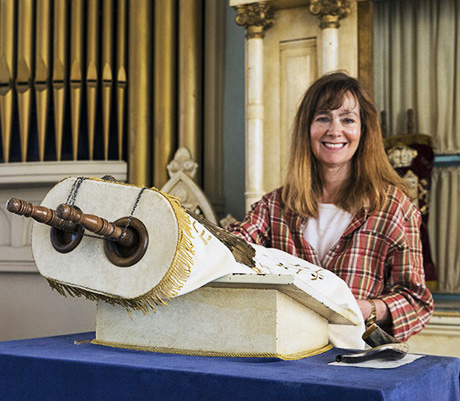|
In the late eighteenth century 'modern' Jews were having their own
Haskalah, or Jewish Enlightenment. The goal of that religious review
and revision was to keep what was most valued - Judaism's emphasis on
love of God, and responsibility for others - while eliminating its
archaic rituals. So began a debate - spirituality versus tradition,
ritual, and indenture to mitzvot (commandments). In other words, can
'Avinu Malkanu' ( our father, our king) see into the repentant hearts of
his scattered flock and inscribe them for another year in the Book of
Life, or must they swing a chicken every Yom Kippur to pinpoint
their whereabouts 'just in case.' They debated. Perhaps if the
peculiarities of Orthodoxy were moderated the business of 'tikkun olam'
(repairing the world) would be less fettered to the idiosyncratic
behavior that took time away from that most important assignment. The
Reform movement sought to retain and promote what was and is Judaism's
calling and gift - its exquisite ethical doctrine of loving God with a
purity that radiates as a 'light to the nations.'
In the mid nineteenth century, several Jewish families of the German Reform movement immigrated to the United States and decided that a small river town named Owensboro might be just the place to practice their religion, rear their children and participate in the commerce of the area. As was customary, they bought land for a cemetery first, around 1858, and some twenty years later bought land in town and built the synagogue they named Temple Adath Israel. It is a beautiful synagogue. This is where our congregation has met for more than 150 years. There have never been more than 50 families so it would be correct to assume that everyone who visits is more than welcome. Perhaps the most enjoyable times we have as a group are the Shabbat evening Torah studies. Everyone is encouraged to participate. The first Friday evening of the month is a simple Shabbat service. The other Friday evenings are devoted to the Torah parsha, the questions it raises, and the discussion it encourages. Here also tzedakah (charity) is apolitical. It goes to anyone in need. We keep the focus on spiritual topics. Contemporary issues are for another venue. It is far more productive to marvel at our blessings than to bemoan their absence. And, while we never forget, or grow lax or inattentive like those of Gideon's men who took their eyes off imminent danger to sate their thirst, we try instead to concentrate on all for which we are grateful. As Rabbi Lord Jonathan Sacks said speaking on Tzav, "To be a Jew is to give thanks.... there were Jews who, after the Holocaust, sought to define Jewish identity in terms of suffering, victimhood, survival. Yes, there is Jewish suffering. Yet, had this been all, Jews would not have done what in fact most did: hand on their identity to their children as their most precious legacy. To be a Jew is to feel a sense of gratitude; to see life itself as a gift; to be able to live through suffering without being defined by it; to give hope the victory over fear. To be a Jew is to offer thanks." |

